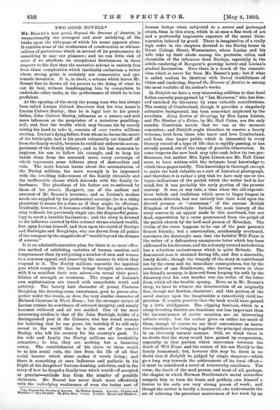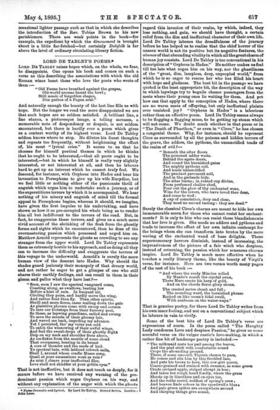TWO GOOD NOVELS.*
Ms. BESANT'S new novel, Beyond the Dreams of Avarice, is unquestionably the strongest and most satisfying of the books upon the title-page of which his name appears alone. It exhibits none of the weaknesses of construction or whimsi- calities of portraiture which in several of its predecessors do something to mar our pleasure ; and we run little risk of error if we attribute its exceptional flawlessness in these respects to the fact that the narrative scheme is entirely free from those complexities which inevitably embarrass a writer whose strong point is certainly not consecutive and sys- tematic invention. It is, in short, a scheme which leaves Mr.
Besant free to devote all his powers to the doing of what he can do best, without handicapping him by compulsion to undertake other tasks, in the performance of which he is less proficient.
At the opening of the story the young man who has always been called Lucian Calvert discovers that his true name is Lucian Calvert Barley; that he is legal heir to his grand- father, John Calvert Burley, infamous as a usurer, and still more infamous as the proprietor of a notorious gambling- hell ; and that the wealth which may become his by merely raising his hand to take it, consists of over twelve millions sterling. Lucian's dying father, from whom he learns the secret of his birthright, had in his youth voluntarily cut himself off from the family wealth, because he could not endure the accom- paniment of the family infamy ; and in his last moments he implores his son to follow his example, and to keep his hands clean from the accursed store, every sovereign of which represents some hideous story of destruction and ruin. The more Lucian learns about the accumulation of the Burley millions, the more strongly is he impressed with the revolting hideousness of the family chronicle and the ineffaceable shame which descends with the family in- heritance. The pleadings of his father are re.enforced by those of his fiancee, Margaret, one of the noblest and sweetest of Mr. Besant's heroines ; and as Lucian's modest needs are supplied by his professional earnings (he is a rising physician) it seems for a time as if they might be effectual. Gradually, however, it becomes evident that the gold is begin- ning to dazzle his previously single eye, the disgraceful genea- logy to exert a horrible fascination ; and the story is devoted to the influence exerted by this colossal shame-stained wealth, first upon Lucian himself, and then upon the crowd of Burleys and Bur]eighs and Burghleys, who are drawn from all points of the compass by the magnitude of "wealth beyond the dreams of avance."
It is an admirable narrative plan, for there is no more effec- tive method of exhibiting varieties of human emotion and temperament than by subjecting a number of men and women to a common appeal, and observing the manner in which they respond to it. The Burley millions resemble the mystical gem which compels the human beings brought into contact with it to manifest their true selves,—to reveal their possi- bilities of strength or weakness. The stages of Lucian's own sophistication are traced with remarkable truth and subtlety. The loosely knit character of young Clarence Burghley, the drawing-room entertainer, goes to pieces alto- gether under the strain, as does the very similar character of Richard Carstone in Bleak House ; but the stronger nature of Lucian retains its semblance of outward integrity, and simply becomes withered and all but ossified. One of the most interesting studies is that of Sir John Burleigh, holder of a distinguished post in the Colonies, who has sound reasons for believing that he can prove his heirship if he will only reveal to the world that he is the son of the convict Burley, who left his country for his country's good. To his wife and family the Burley millions are irresistibly attractive ; to him they are nothing but a haunting terror. The establishment of his claim to them would be to him social ruin, the loss from his life of all that social honour which alone makes it worth living ; and there is something at once ludicrous and pathetic in his fright at his daughters' fortune-hunting activities, and in the story of how: he forged a family tree which would—if accepted as genuine—exclude him from the number of possible claimants. Mr. Besant has never dealt more effectively with the underlying weaknesses of even the better sort of • (1) Remold the Dreams of Avarice. By Walter Besant. London: (Matto and Windus.—(2,) DatefoUc. By Alice Rea. 3 vols. London: Heist and Blackat. human beings when subjected to a severe and prolonged strain, than in this story, which is at once a fine work of art and a profoundly impressive exposure of the moral disin- tegration induced by greed. There is imagination of a really high order in the chapters devoted to the Burley house in Great College Street, Westminster, where Lucian and his wife take up their abode among the portraits, relics, and chronicles of the infamous dead Burleys, especially in the subtle rendering of Margaret's growing horror and Lucian's gradual fascination. Here there is a touch of. the romanti- cism which is never far from Mr. Besant's pen ; but if what is called realism be identical with literal truthfulness of vision and rendering, Beyond the Dreams of Avarice is among the most realistic of its author's works.
In Dalefolk we have a very interesting addition to that local fiction recently panegyrised by "Ian Maclaren," who has him- self enriched its literature by some valuable contributions. The county cf Cumberland, though it provides a singularly attractive background, has been somewhat neglected by the novelists. Lizzy Lorton of Greyrigg, by Mrs. Lynn Linton, and The Shadow of a Crime, by Mr. Hall Caine, are the only notable Cumbrian novels that we can at the moment. remember; and Dalefolk ought therefore to receive a hearty welcome, both from those who know and love Cumberland, and from that larger public which is interested in every literary record of a type of life that is rapidly passing, or has already passed, out of the range of possible observation. In some respects the new book may take rank below its two pre- decessors, but neither Mrs. Lynn Linton nor Mr. Hall Caine seem to have written with the intimate local knowledge to which these pages testify. This knowledge is thorough enough to make the book valuable as a sort of historical photograph, and therefore it is rather a pity that we have only one or two vague indications of the period which the writer had in her mind, but it was probably the early portion of the present. century. It was, at any rate, a time when the old supersti- tious beliefs and traditions which seem to linger longest in mountain districts, had not entirely lost their hold upon the shrewd yeomen or " statesmen " of the ancient British Kingdom of Strathclyde. Indeed, the main history of the story centres in an appeal made to this moribund, but not dead, superstition by a curse pronounced from the pulpit of the parish church by the half-mad parson of Miterdale. The victim of the curse happens to be one of the poor parson's firmest friends ; but a conversation, accidentally overheard, convinces the distraught man that the faithful Will Frear is the writer of a defamatory anonymous letter which has been addressed to his diocesan, and the solemnly uttered malediction
has a relentless exclusiveness which is quite Hebraic. The denounced man is shunned during life, and dies a miserable, lonely death ; though the tragedy of the story is contributed not by the curse and its immediate consequences, but by the cowardice of one Braithwaite, who, having sworn to clear his friend's memory, is deterred from keeping his oath by the discovery that his own brother was the writer of the letter from which all the trouble sprang. Here, as in Mr. Besant's story, we have to witness the deterioration of an originally fine, though not flawless, character ; and this portion of the novel stamps upon the imagination a remarkably vivid im- pression. It is quite possible that the book would have gained by a little abridgment. The clipping festivals, which in a. sheep-breeding district are functions not less important than the harvest-homes of arable counties, are an interesting artistic study ; but the author gives us rather too much of them, though of course we see their convenience as narra, tive expedients for bringing together the principal characters in an obviously natural manner. Still, we think there is no doubt that the story would have gained by compression, especially in that portion which intervenes between the death of Will Frear and the return of his son Hartly to the
family homestead ; but, however this may be, there is no doubt that if Dalefolk be judged by single chapters—which go a long way towards the achievement of its total effect—
it must be considered a novel of noteworthy excellence. The curse, the death of the mad parson, and most of all, perhaps, the chapter in which Norman Braithwaite's moral cowardice compels him to burn his boats and publicly own himself a traitor to his oath, are very strong pieces of work ; and though the author is hardly a humonrist, she understands the art of relieving the prevalent sombreness of her work by an
occasional lighter passage such as that in which she describes the introduction of the Rev. Tobias Brown to his new parishioners. There are weak points in the book—for example, the expedient by which the dinonentent is brought about is a little far-fetched—but certainly Dalefolk is far above the level of ordinary circulating-library fiction.







































 Previous page
Previous page